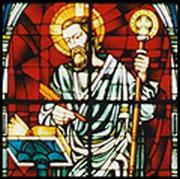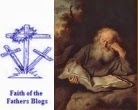
Saint, Apostolic Father, Martyr, And Bishop
Saint Ignatius of Antioch was born in Syria circa 35 AD and died circa 107 AD in Rome, martyred by being thrown to “the wild beasts” (lions). Saint Ignatius is probably best known by most Catholics for his being the first of the writings of the Early Church where the word Catholic is used in describing the Church.
Saint Ignatius, like Saint Polycarp of Smyrna, had been a disciple of Saint John the Apostle. Saint Ignatius was also known as Theophorous , meaning God-Bearer. One reason given for this name is that many of the early writers declared that Saint Ignatius was the infant that Jesus took in his arms and sat in the midst of His Disciples in Mark 9. With Saint Peter being the first Bishop of Antioch, Saint Ignatius was the third, having been appointed bishop by Saint Peter himself.
Saint Ignatius was a learned and courageous leader of his flock. During the persecutions under the emperor Domitian, Ignatius worked diligently to encourage the weaker members of his flock, and did all he could to protect and defend his flock of believers. With the death of Domitian, the persecutions ended for a brief while, and in truth, Saint Ignatius was disappointed that he had not been martyred for Christ. He did not have to wait long, as the persecutions soon began again under the emperor Trajan. According to “The Martyrdom of Ignatius”, Trajan “being lifted up [with pride], after the victory he had gained over the Scythians and Dacians, and many other nations”, saw the Christians as the only obstacle “to complete the subjugation of all things to himself". He then threatened to renew the persecutions against the Christians unless they began to worship and offer sacrifice to the gods of Rome. Trajan made his way to Antioch, and Saint Ignatius once again worked tirelessly to protect his flock, and in so doing brought attention to himself and his successful efforts from the emperor Trajan.
He was taken before Trajan, who called him wicked for refusing to obey the commands of the emperor and for encouraging others to disobey. According to “The Martyrdom of Ignatius”, Ignatius replied "No one ought to call Theophorus wicked; for all evil spirits have departed from the servants of God. But if, because I am an enemy to these [spirits], you call me wicked in respect to them, I quite agree with you; for inasmuch as I have Christ the King of heaven [within me], I destroy all the devices of these [evil spirits]." Trajan asked him many others things, and made other accusations against Saint Ignatius, and when Saint Ignatius proclaimed Christ in his heart, Trajan commanded that Ignatius be carried from Antioch to Rome to be fed to “the beasts” for the “gratification of the people”. The trip from Antioch in Syria to Rome, was a trip that would take months to complete.
How did Saint Ignatius react to this command from the emperor? Again, according to “The Martyrdom of Ignatius”, Ignatius cried out with much joy, "I thank thee, O Lord, that Thou hast vouchsafed to honor me with a perfect love towards Thee, and hast made me to be bound with iron chains, like Thy Apostle Paul."
Soon, the other Church's in Asia Minor heard of Ignatius, bound in chains being taken captive to Rome, and many of the Church's either went out en masse, or sent representatives, to encourage and talk to Saint Ignatius as he passed. Among those who came to encourage and strengthen him, was Saint Polycarp, Bishop of Smyrna.
In response, Saint Ignatius wrote seven Epistles. To the Church's that came or sent delegates, he wrote five: Ephesians, Magnesians, Trallians, Philadelphians, and Smyrnaeans. He wrote one to Saint Polycarp, and one to the congregation that would meet him at the end of the journey, Romans. In his letter to the Romans he mentions the hardships of his journey and compares the ten soldiers accompanying him to leopards, "From Syria even to Rome I fight with wild beasts, by land and sea, by night and by day, being bound amidst ten leopards, even a company of soldiers, who only grow worse when they are kindly treated."
His letter to the Romans is probably the best known, and in it, he exhorts the Roman congregation not to make any efforts to secure his release, to not deny him this act of dying for God. He wrote:"I am writing to all the churches to let it be known that I will gladly die for God if only you do not stand in my way. I plead with you: show me no untimely kindness. Let me be food for the wild beasts, for they are my way to God. I am God's wheat and bread. Pray to Christ for me that the animals will be the means of making me a sacrificial victim for God...The prince of this world is determined to lay hold of me and to undermine my will which is intent on God. Let none of you here help him; instead show yourselves on my side, which is also God's side...Rather within me is the living water which says deep inside me: "Come to the Father."
You may click on the title to read “The Epistles of Ignatius”online. Click on this title to read “The Martyrdom of Ignatius”.
Now below are some excerpts from various Saints and other sources on Saint Ignatius of Antioch.
From The Golden Legend: "It is read that Saint Ignatius in all his torments and all the pains of martyrdom that he suffered, that his tongue never ceased to name the name of Jesus, and when they that tormented him demanded him wherefore he named this name so oft, he answered: Know ye for certain that I have in my heart this name written, and therefore I may not leave to name this name oft. And because hereof, when he was dead, they that heard these words opened his body and drew out his heart and cut it open, and they found within the name of Jesus written with fair letters of gold, for which miracle many received the faith of Jesu Christ."
Homily of Saint John Chrysostom on Saint Ignatius of Antioch: “For that which Christ declared to be the highest standard and rule of the Episcopal office, did this man display by his deeds. For having heard Christ saying, the good shepherd layeth down his life for the sheep, with all courage he did lay it down for the sheep.”
Cardinal Newman said ("The Theology of the Seven Epistles of St. Ignatius", in "Historical Sketches", I, London, 1890): "the whole system of Catholic doctrine may be discovered, at least in outline, not to say in parts filled up, in the course of his seven epistles".
Addendum
This is from Saint Jerome's work, "Lives of Illustrious Men":
Ignatius the bishop
Ignatius, third bishop of the church of Antioch after Peter the apostle, condemned to the wild beasts during the persecution of Trajan, was sent bound to Rome, and when he had come on his voyage as far as Smyrna, where Polycarp the pupil of John was bishop, he wrote one epistle To the Ephesians, another To the Magnesians, a third To the Trallians, a fourth To the Romans, and going thence, he wrote To the Philadelphians and To the Smyrneans, and especially To Polycarp, commending to him the church at Antioch. In this last he bore witness to the Gospel which I have recently translated, in respect of the person of Christ saying, "I indeed saw him in the flesh after the resurrection and I believe that he is," and when he came to Peter and those who were with Peter, he said to them, "Behold! touch me and see me bow that I am not an incorporeal spirit" and straightway they touched him and believed. Moreover it seems worth while inasmuch as we have made mention of such a man and of the Epistle which he wrote to the Romans, to give a few "quotations" : "From Syria even unto Rome I fight with wild beasts, by land and by sea, by night and by day, being bound amidst ten leopards, that is to say soldiers who guard me and who only become worse when they are well treated. Their wrong doing, however is my schoolmaster, but I am not thereby justified. May I have joy of the beasts that are prepared for me; and I pray that I may find them ready; I will even coax them to devour me quickly that they may not treat me as they have some whom they have refused to touch through fear. And if they are unwilling, I will compel them to devour me. Forgive me my children, I know what is expedient for me. Now do I begin to be a disciple, and desire none of the things visible that I may attain unto Jesus Christ. Let fire and cross and attacks of wild beasts, let wrenching of bones, cutting apart of limbs, crushing of the whole body, tortures of the devil, let all these come upon me if only I may attain unto the joy which is in Christ." When he had been condemned to the wild beasts and with zeal for martyrdom heard the lions roaring, he said "I am the grain of Christ. I am ground by the teeth of the wild beasts that I may be found the bread of the world." He was put to death the eleventh year of Trajan and the remains of his body lie in Antioch outside the Daphnitic gate in the cemetery.
Copyright © 2005 Steve Smith. All rights reserved.

